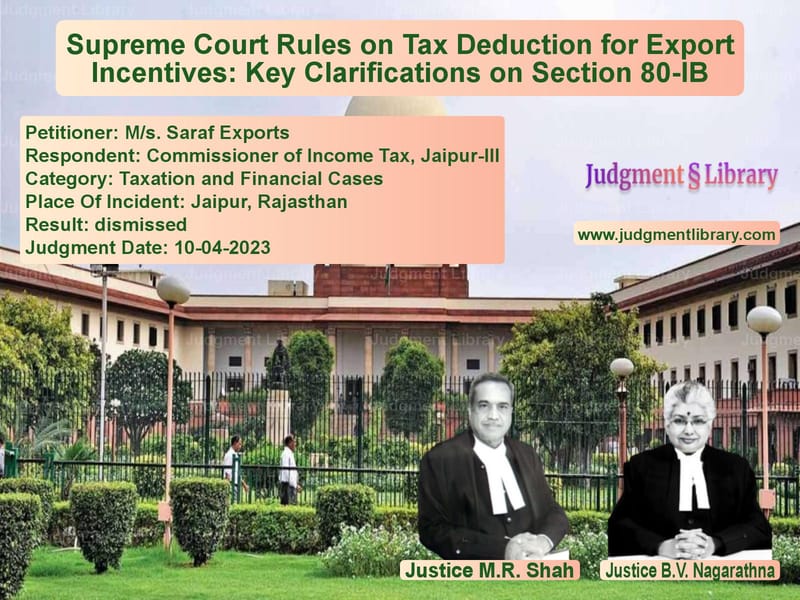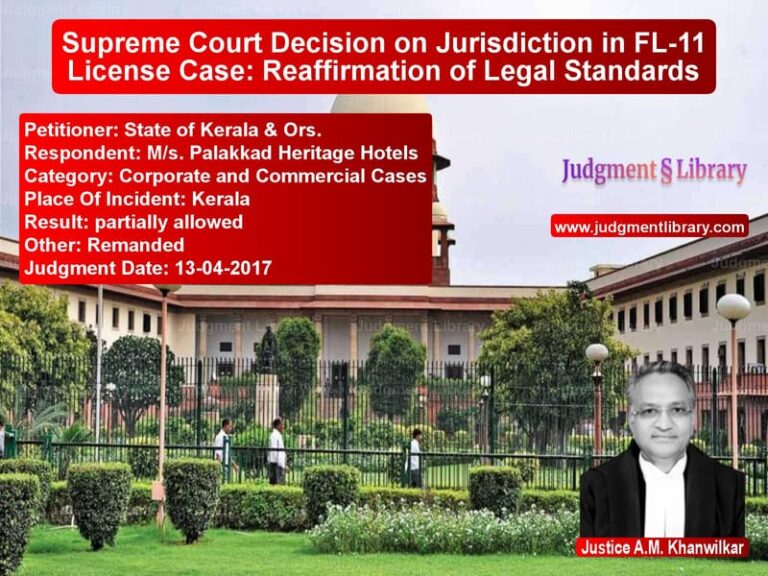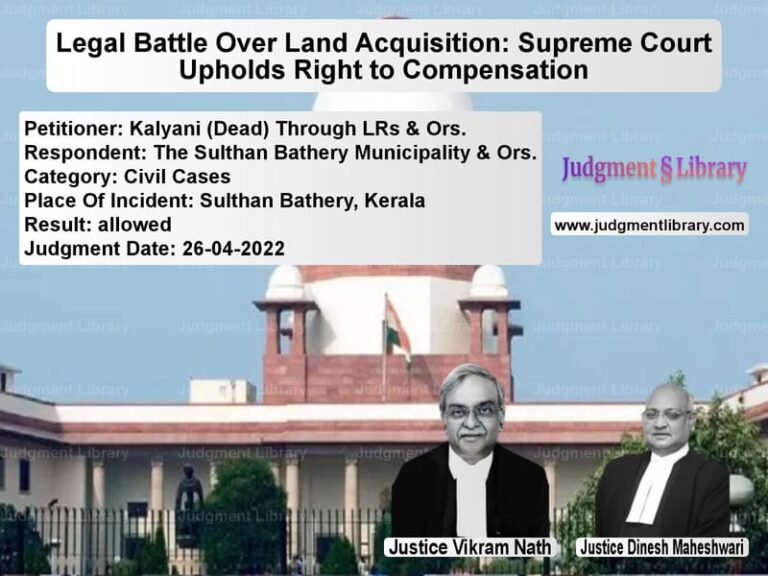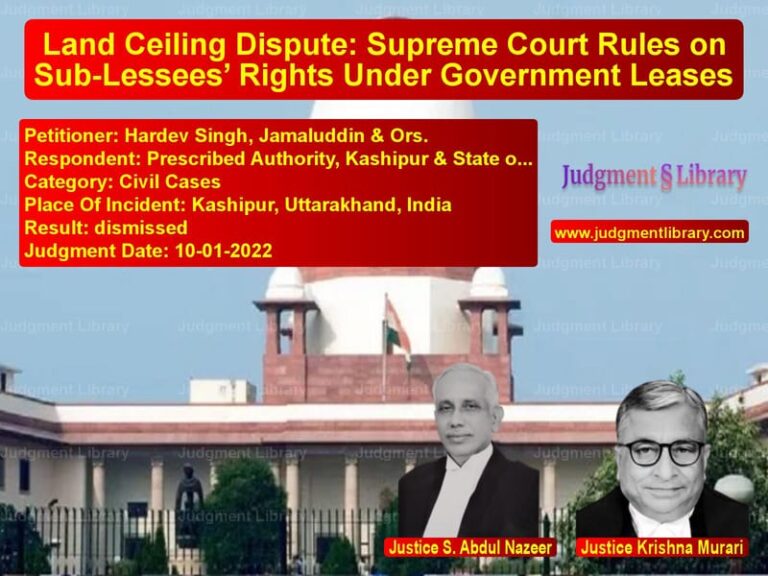Supreme Court Rules on Tax Deduction for Export Incentives: Key Clarifications on Section 80-IB
The Supreme Court of India recently delivered a landmark judgment in M/s. Saraf Exports vs. Commissioner of Income Tax, Jaipur-III, addressing a significant question concerning tax deductions under Section 80-IB of the Income Tax Act, 1961. The case revolved around whether export incentives such as Duty Drawback and Duty Entitlement Pass Book (DEPB) benefits qualify as ‘profits and gains derived from an industrial undertaking’ for the purpose of tax deductions.
Background of the Case
The appellant, M/s. Saraf Exports, is a partnership firm engaged in the business of manufacturing and exporting wooden handicraft items. For the assessment year 2008-09, the firm filed its tax return, claiming deductions of Rs. 70,197 on account of DEPB and Rs. 76,27,636 under the Duty Drawback scheme. These amounts were credited as business profits under Sections 28(iiic) and 28(iiib) of the Income Tax Act.
Disallowance of Deductions
- The Deputy Commissioner of Income Tax disallowed these deductions in an assessment order dated 24.11.2010.
- The Commissioner of Income Tax (Appeals) upheld the disallowance.
- The Income Tax Appellate Tribunal (ITAT), however, overturned the decision, allowing the deductions while observing that the Supreme Court’s judgment in Liberty India vs. CIT (2009) was per incuriam.
- The High Court of Rajasthan reinstated the disallowance, citing Liberty India and Commissioner of Income Tax vs. Sterling Foods, Mangalore.
Key Legal Issue
The core issue before the Supreme Court was:
- Do Duty Drawback and DEPB benefits constitute profits ‘derived from’ an industrial undertaking under Section 80-IB of the Income Tax Act?
Arguments by the Appellant
The appellant’s legal team, led by Senior Advocate Sachin Patil, argued:
- That Duty Drawback and DEPB benefits were directly linked to the manufacturing activity.
- That these incentives are part of the profits generated from industrial undertakings.
- The Supreme Court’s ruling in Meghalaya Steels Ltd. (2016) expanded the interpretation of ‘derived from’ under Section 80-IB.
- The High Court’s reliance on Liberty India was misplaced, as that case did not address subsidies linked to actual manufacturing costs.
Arguments by the Respondents
Appearing for the Income Tax Department, Additional Solicitor General Balbir Singh countered:
- The issue was already settled in Liberty India (2009) and Sterling Foods (1999), which ruled that export incentives do not qualify as profits derived from industrial undertakings.
- The term ‘derived from’ is distinct from ‘attributable to’ and must be interpreted narrowly.
- Section 28 of the Income Tax Act includes Duty Drawback and DEPB benefits as business income, but they remain ancillary profits, not directly linked to manufacturing.
- The ruling in Meghalaya Steels Ltd. does not apply, as that case involved subsidies on manufacturing costs, unlike Duty Drawback and DEPB benefits.
Supreme Court’s Observations
A bench comprising Justices M.R. Shah and B.V. Nagarathna analyzed previous rulings and held:
- That Duty Drawback and DEPB benefits originate from government schemes and do not have a direct nexus with the manufacturing activity itself.
- That Liberty India (2009) and Sterling Foods (1999) remain binding precedents, confirming that export incentives do not qualify for deductions under Section 80-IB.
- The Court distinguished the case from Meghalaya Steels Ltd. (2016), where transport and power subsidies were considered as part of business income because they were directly linked to the cost of manufacturing.
Final Judgment
The Supreme Court ruled:
- The High Court’s decision was correct in disallowing deductions on Duty Drawback and DEPB benefits.
- Such incentives cannot be considered as income ‘derived from’ an industrial undertaking.
- The appeal was dismissed, reaffirming the precedents set in Liberty India and Sterling Foods.
Implications of the Judgment
This ruling has significant implications for businesses claiming deductions under Section 80-IB:
- Restricted Scope of Deductions: Only profits directly generated from manufacturing qualify for tax deductions.
- Government Incentives Not Included: Export incentives remain taxable as business income but do not qualify as manufacturing-derived profits.
- Clarification on Section 80-IB: The ruling prevents ambiguity in tax deduction claims related to export-linked profits.
Conclusion
The Supreme Court’s ruling in M/s. Saraf Exports vs. Commissioner of Income Tax reaffirms the principle that export incentives, such as Duty Drawback and DEPB benefits, are not profits derived from an industrial undertaking for the purpose of tax deductions under Section 80-IB. This decision provides clarity for businesses and tax authorities, ensuring a consistent interpretation of income tax laws.
Petitioner Name: M/s. Saraf Exports.Respondent Name: Commissioner of Income Tax, Jaipur-III.Judgment By: Justice M.R. Shah, Justice B.V. Nagarathna.Place Of Incident: Jaipur, Rajasthan.Judgment Date: 10-04-2023.
Don’t miss out on the full details! Download the complete judgment in PDF format below and gain valuable insights instantly!
Download Judgment: ms.-saraf-exports-vs-commissioner-of-inco-supreme-court-of-india-judgment-dated-10-04-2023.pdf
Directly Download Judgment: Directly download this Judgment
See all petitions in Income Tax Disputes
See all petitions in Tax Evasion Cases
See all petitions in Tax Refund Disputes
See all petitions in Judgment by Mukeshkumar Rasikbhai Shah
See all petitions in Judgment by B.V. Nagarathna
See all petitions in dismissed
See all petitions in supreme court of India judgments April 2023
See all petitions in 2023 judgments
See all posts in Taxation and Financial Cases Category
See all allowed petitions in Taxation and Financial Cases Category
See all Dismissed petitions in Taxation and Financial Cases Category
See all partially allowed petitions in Taxation and Financial Cases Category







